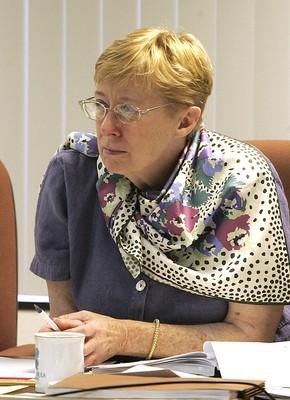Regulators seek short-term solutions for natural-gas crunch
Natural-gas use is growing and supplies are decreasing, leading state utilities regulators on Friday to review partial solutions, including more efficient water- and space-heating systems for homes and businesses.
Chairwoman Jo Ann Kelly of the Public Utilities Commission called the meeting as part of her campaign to address prospects of a looming gas shortage. Kelly earlier directed gas utility representatives to discuss gas supply issues quarterly. She announced plans to hold a statewide gas summit at an undetermined location in September.
Partial solutions range from developing new domestic gas fields, using nonconventional gas such as coal-bed methane, building giant terminals for imported gas from overseas and persuading consumers to buy gas-efficient appliances.
Homeowners already can install tankless water heaters, which conserve gas by only heating water when a hot water faucet is turned on in the house, rather than continually heating the water.
"Much of the energy is lost in the stand-by mode," said Ron Edelstein, director of state regulatory programs for the Gas Technology Institute.
Tankless water heaters are 80 percent efficient in use of gas, compared to 50 percent to 55 percent for the conventional water heater, Edelstein said. Tankless units are well-suited for mobile homes and small apartments.
Edelstein expects American manufacturers to start selling tankless water heaters within a couple of years, but European companies already offer tankless units. German manufacturer Bosch sells tankless water heaters through Southern Nevada home improvement stores.
Combination space-water heaters appear to be even more efficient and probably will become available within 18 months, Edelstein predicted.
The same unit heats both water and the house, achieving 92 percent efficiency, he said.
Kelly wants to incorporate programs that encourage this kind of technology into new natural gas conservation programs.
A new state law directs the utilities commission to develop rules for natural gas conservation programs. The conservation program, Kelly said, should help commercial customers and residential customers, particularly low-income customers, because of forecasts that gas prices will increase.
"The people it hits are always the ones that are least able to pay bills," Kelly said.
For several years, Nevada Power Co. and Sierra Pacific Power Co. have been required to offer energy conservation programs. Kelly believes those programs provide a good model to follow in developing a similar program for natural gas.
On Friday, she and Edelstein also reviewed gas issues from a regional and global perspective.
Since 2001, Nevada's natural gas consumption for power generation has climbed 21 percent and residential gas use has risen by 16 percent.
U.S. gas production is gradually declining, as is production in Canada, Edelstein said. Gas exploration companies are working to develop new wells, but environmental restrictions and community opposition prevent gas drilling in parts of the Rocky Mountains and off the California coast.
"You're running fast just to keep in pace (with growing demand).," Edelstein said.
Natural gas from Australia, Russia and Indonesia may be liquefied and shipped to the United States, but California has stopped development of LNG terminals where the gas could be unloaded from ships.
Edelstein said that Nevada probably will be able to draw gas from LNG terminals off the Mexican and Canadian coasts, but he said imported gas may be costly.
The United States can tap into coal-bed methane, "tight gas sands" gas and shale to increase gas supply, Edelstein said.
Demand for gas shot up in recent years as utilities and merchant power companies began to build almost entirely gas-fired power plants.
Gas-fired plants produce smaller quantities of carbon dioxide. Scientists say carbon dioxide leads to global warming.
"It has a much smaller carbon footprint than any other form of fossil fuel," Edelstein said. "That's why it's the preferred fuel of power plants."
Coal is a cheaper but dirtier fuel, he said. Coal-fired plants emit massive quantities of carbon dioxide, but Edelstein said technology for capturing the carbon dioxide needs further development.
"Nuclear (power) is a solution to the global warming problem? Will anyone permit a (new) nuclear plant? We will see."
Meanwhile, "the need for electricity is going to drive the natural gas price" for the next several years, he said.
Edelstein encouraged the commission to consider joining the 22 states that voluntarily support research work at the Gas Research Institute. He suggested Nevada regulators raise gas rates by 90 cents per year to generate money for the contribution.

















